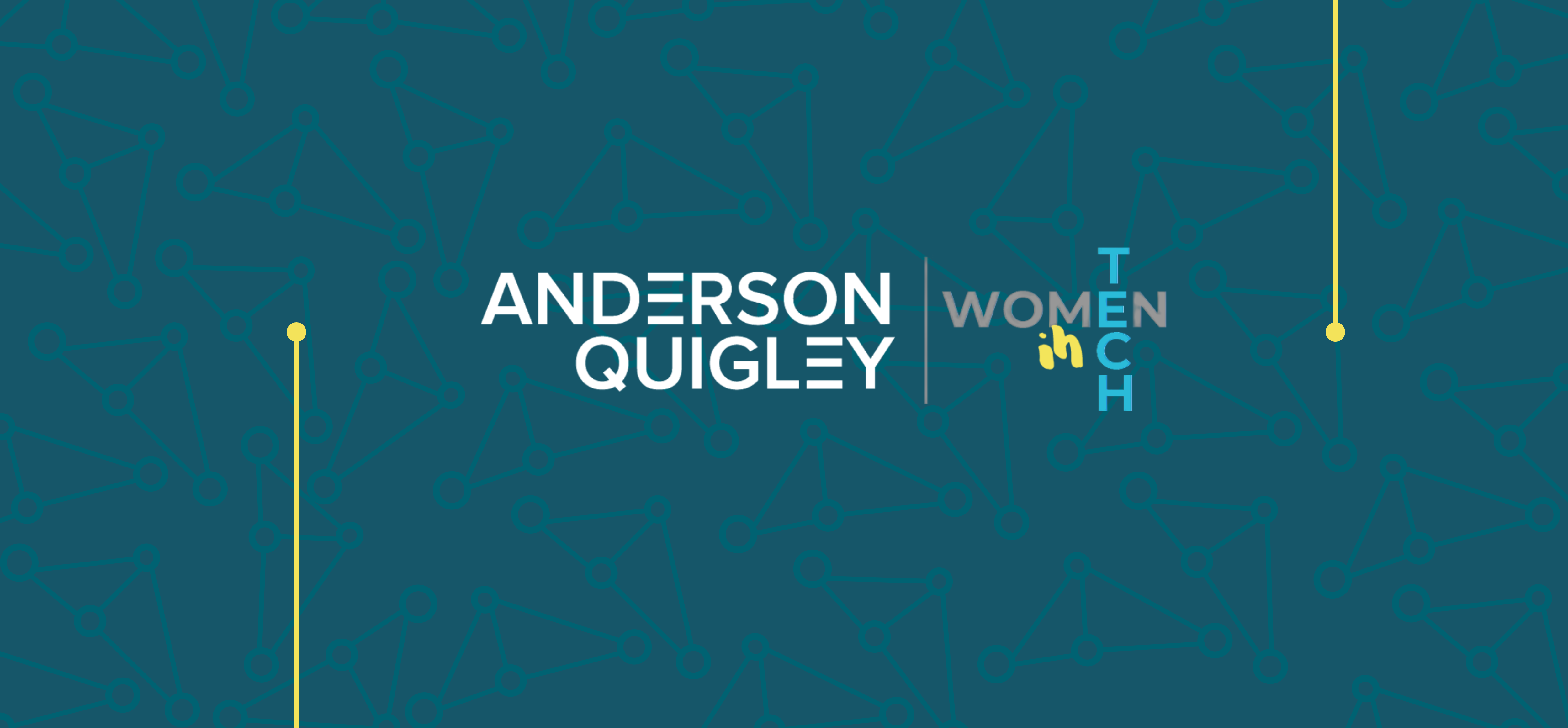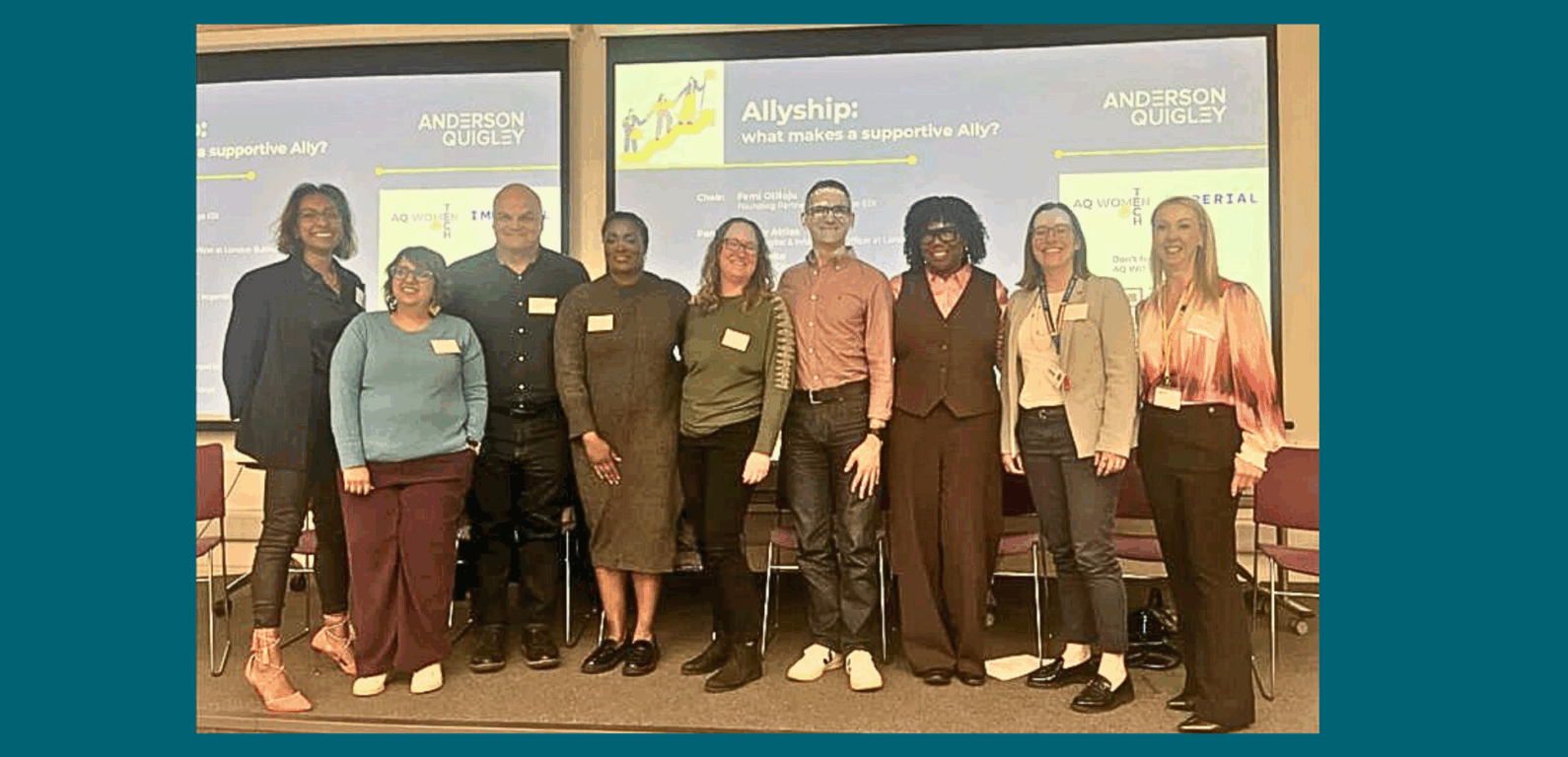
30 April 2025
Last week, in partnership with Imperial College London, AQ hosted our latest Women in Tech event, which brought together a diverse group of voices to explore what it really means to be an ally. Grace Tattersall, AQ Partner, introduced the event, and stressed the importance of recognising intersectionality and being mindful of those unique experiences, honouring people’s identities, recognising your own privilege, and doing the work to challenge the interconnected systems of inequality that exist around us.
From personal stories to structural strategies, the panel, superbly chaired by Femi Otitoju, Founding Partner of Challenge EDI, unpacked the challenges and responsibilities of allyship, and how individuals and organisations can create better and more inclusive cultures.
“Allyship is a verb, not a noun”
Jenny Rae, Chief Information Officer at Imperial, opened the event with a reminder of Imperial’s founding mission: “to be useful.” It’s a theme that ran through the discussions. “I wouldn’t be standing here today as the Chief Information Officer at Imperial without allyship,” she said. True allyship is rooted in doing, not just saying. It means stepping up, especially when things go wrong, and embedding inclusive values like kindness and courage into daily decision-making.
Others on the panel echoed the need for action. Danny Attias, Chief Digital & Information Officer at London Business School, reflected on his journey from awareness to leadership: “You don’t wake up one morning and say I’m going to take the bullet… it’s recognising the issue, understanding the impact, and then choosing to lead change.”
His honesty was echoed by Gill Cooke, Inclusion Consultant & Coach, who stressed the importance of humility: “Don’t get defensive about privilege… just because it’s not your truth, doesn’t mean it might not be someone else’s.” Gill also stressed the financial case for allyship and wider diversity drives, and that leaders should recognise the cost benefits of this work.
For Nadine Leighton, Marketing Director at Bright, allyship is about visibility and everyday leadership: “You don’t need to be in a leadership position to be an ally.” That means making space for others and using your voice, whether that’s calling something out, or simply saying hello to the person no one else has welcomed. People should not fear reaching out and speaking up.
Mat Mallett, technology executive and board advisor, urged individuals to “be willing to put yourself at the front”. He also stressed the need to galvanise men. One of his tactics is to “play the fool to try and naturalise and reduce fear of saying the wrong thing”.
Kavita Kapoor, Director of Digital Products at Imperial, spoke about the emotional labour of allyship: “It’s relentless.” However, she reminded us of the importance of persisting and educating. Education, she reminded us, is one of the few privileges we can share.
And for Marsha Ramroop, Inclusion Strategist, and author of Building Inclusion, allyship is a leadership imperative. “If nothing is changing for those groups, it’s not really allyship.” She called for inclusive behaviours, cultural intelligence, and a willingness to “put your body in the way of bullets”: to advocate, to sponsor, and to act, especially when others aren’t in the room. Importantly, it’s also a skill that can be learnt as a leadership team.
The group went on to discuss further tangible actions, for instance being willing, particularly as a leader, to be that person to put your hand up when something does go wrong. There is nothing wrong with being seen as a “trouble maker” if you consistently speak up – see yourself as a “change agent” and know that you are laying the path for others.
If you can, you should also try to build allyship. If you are the only woman in the room, try and seek out an ally, or find your tribe and community. You should also never be afraid to ask for help, which includes men – in almost every case, they are more than happy to help.
More widely, the panel discussed the need to be more intentional, more strategic, and more human in how we lead; we don’t have all the answers, we should all be willing to ask other, listen carefully. and hear from others to ensure we are as inclusive as possible. Whether through structural tools like Employee Resource Groups and flexible working, or simply mentoring someone different from ourselves, the call was clear: we all have a role to play.
Leadership is not about having all the answers, it’s also about asking better questions. Being an ally isn’t just about protecting others, it’s about becoming more self-aware, more open, and more willing to create the kind of workplaces we all want to be part of.

To learn more about future events, join our AQ Women in Tech group.